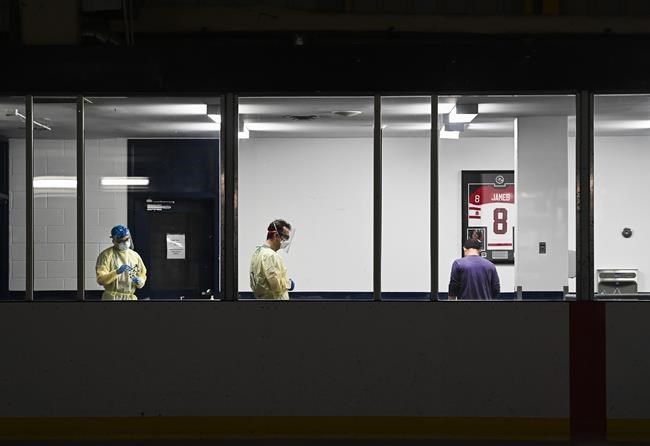TORONTO — Ontario needs a proactive and comprehensive strategy to deal with long COVID, which is likely to impart a significant burden on the province's population and its health-care system, the recently disbanded science table reported Wednesday.
The team of scientists found that substantial investment in research and health-care resources is needed to mitigate the long-term health, social and economic impacts of long COVID, which they refer to as post COVID-19 condition.
"Given that range of effects of the post COVID condition, it poses a substantial risk and burden to our health-care system, to our citizens and to our economy and social services we need to be proactive in preparing for," lead author Dr. Kieran Quinn said in an interview.
There still remains plenty of uncertainty around long COVID, including how it is defined, said Quinn, a clinician scientist at Sinai Health Systems and a professor at the University of Toronto.
The science table was dissolved this week, but had said it would wrap up its ongoing work. The brief it published Wednesday focused on understanding long COVID.
The group of scientific advisers found the prevalence of long COVID in the population has a wide range, from 2 per cent to 54 per cent, much of that dependent on how the condition is defined.
The science table said the condition was defined as symptoms persisting for at least four or 12 weeks after a COVID-19 infection.
"Current evidence suggests that with a 12-week criterion for symptoms, the post COVID-19 condition likely affects between approximately 2 and 10 per cent of vaccinated persons infected with contemporary variants, but more research is required to confirm these estimates," the brief said.
There is some reason for optimism, Quinn said, in that vaccines and milder variants appear to have had a positive outcome on the prevalence of long COVID.
"A lot of the really high numbers are more early experiences in the pandemic and early variants where we know people were getting a lot sicker from," he said.
Still, the sheer number of people who caught COVID-19 after the Omicron variant arrived means the health-care system is at risk down the road, the table suggested.
The Ministry of Health said it is reviewing the findings from the science table, but did not answer a question about whether or not the province has a plan for the condition.
Last week, chief medical officer of health, Dr. Kieran Moore, said there is a long COVID plan for Ontarians, but did not provide details.
"That's a ministry-funded initiative and I believe they'll be unveiling that in the coming days or weeks," he said.
The science table brief found that researchers have identified a number of different symptoms in those with long COVID.
"More than 100 symptoms have been reported in people with the post-COVID-19 condition, and these appear to be associated with reduced quality of life, reduced function, and impairments in people’s ability to work and care for themselves," the brief wrote.
Fatigue, memory deficits, shortness of breath, sleep problems and joint pain are the five most frequently observed symptoms in those found with long COVID.
Risk factors include being female, belonging to an ethnic minority, socioeconomic deprivation, smoking, obesity and asthma. The risk also increases with age, the brief said.
Quinn also said there is a data void when it comes to long COVID in the province.
In particular, there is a lack of OHIP physician fee codes for long COVID, Quinn said, which makes the issue difficult to track.
"It makes it very challenging to be able to evaluate our health-care system performance to be able to track how much care people need, what kind of care are they getting and how are we doing as far as delivering that care across the entire province without those fees," Quinn said. "So that's a real data void."
The brief also said those long COVID physician fee codes would "incentivize the provision of care for low-income and marginalized populations."
The science table said last week it had been informed by Public Health Ontario that it would be dissolved on Tuesday. The group, made up largely of volunteers, gave advice to the government for much of the pandemic.
Public Health Ontario said a new table, for which terms of reference were published last week, will be independent but won't have final say on what it can investigate. Topics to be studied will be subject to approval from Public Health Ontario.
The new table is set to have its first meeting sometime in October, and will be made up of 15 core members external to Public Health Ontario.
This report by The Canadian Press was first published Sept. 7, 2022.
Liam Casey and Allison Jones, The Canadian Press



